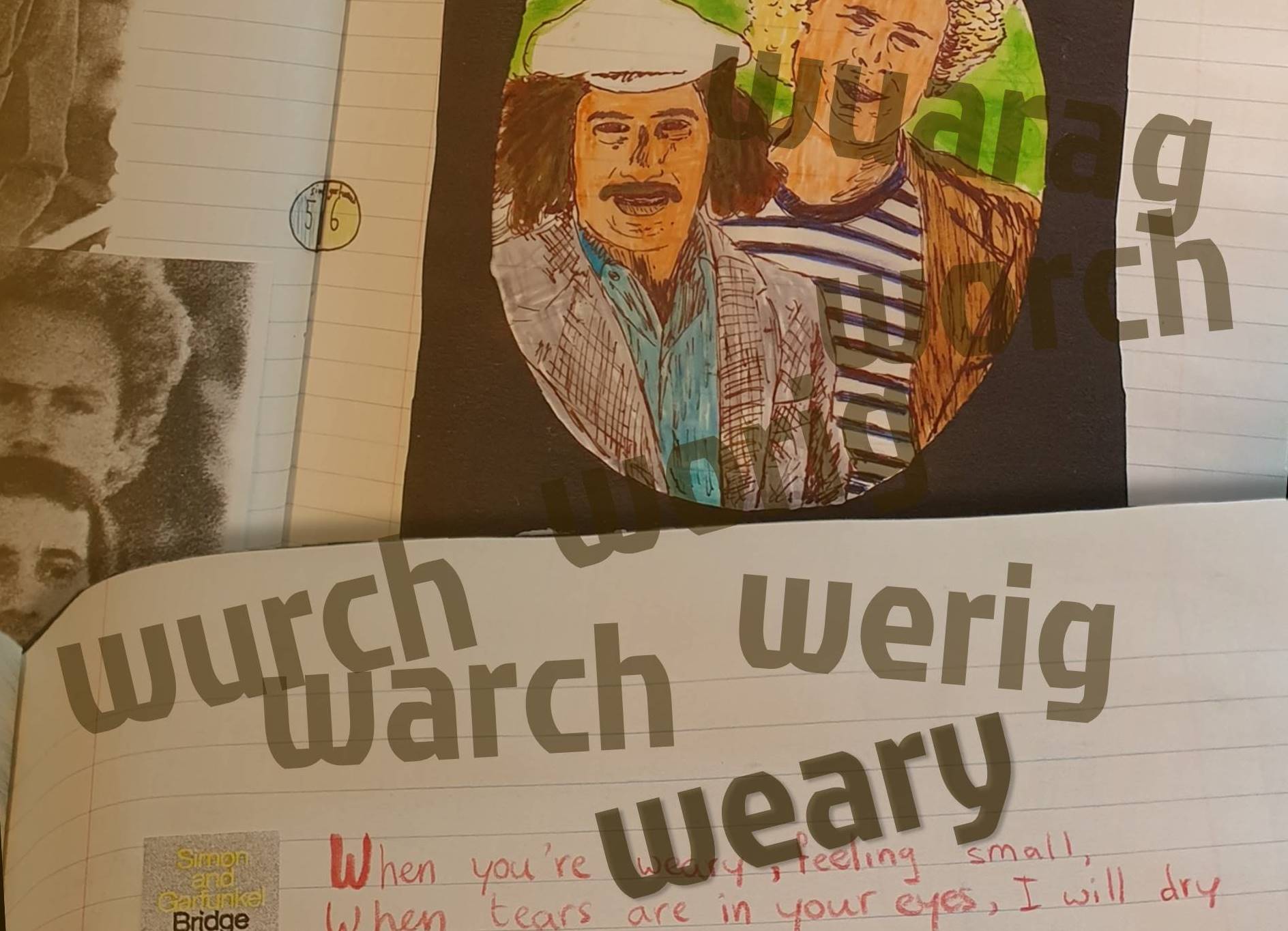WEST GERMANIC
When you're weary
Linguistics
| 15-02-2021
One of the special aspects of being multilingual, is that you can think in one language and speak (almost) simultaneously in the other language. I grew up speaking Dutch, but I always speak Frisian with my wife. And so it is that the other day I thought "ik ben moe" ("I am tired" in Dutch) and said "ik bin wurch" (the same in Frisian), or rather the "Forest Frisian" variant "ik bin warch", with a schwa between the r and ch.

Warrig?
I had already noticed that the words moe and wurch/warch differ from each other, for example when I did not speak Frisian yet and heard the word warch for the first time. Then, at first, I thought I recognized the Dutch warrig (confused), but that did not fit the context. Anyway, the difference between moe and wurch struck me again now and it made me wonder where the word wurch originates from. Dutch has no word that has anything to do with "vermoeidheid" (tiredness) that resembles wurch or warch, and vice versa, Frisian does not have a word that has to do with "wurgens" (tiredness) that makes you think of moe. The Dutch moe, especially in its obsolete form moede, is reminiscent of the German müde. The English language deviates with tired from both wurch/warch and moe or müde, so that doesn't help me either.
Work?
In this section I have often mentioned the lack of a Frisian etymological dictionary. Usually this can be overcome because there is a Dutch word that resembles the Frisian one, or else an English or German word that does that. The Dutch, English and German etymological dictionaries that I use, often also mention Old or older Frisian words that have to do with the keyword, but this is not the case with wurch/warch. Determining the origin of that word requires a little more creativity. This creativity must be accompanied by alertness, in order to avoid hasty conclusions. For example, I found warc, an Old Dutch variant of werk (wurk in Frisian and work in English), which clearly resembles warch. That a word for daily labour would have yielded a word for tiredness could in itself very well be and could be explained logically. Yet warc has a different origin than warch. However, to find that out, I first had to put on music from one of my favourite musician-songwriters.
Weary?
Listening to Paul Simon's classic Bridge Over Troubled Water, I suddenly realized that English does have a word that can reveal more about the origin of the Frisian wurch/warch. The first words Simon had Garfunkel sing, are, as you should know, When you’re weary. And weary not only resembles wurch as a word – at least much more so than moe or tired – but also has a similar meaning. The Van Dale dictionary translates the adjective weary as moe (tired), vermoeiend (exhausting), lusteloos (listless) and vervelend(tiresome). And, as the etymological dictionaries teach me, weary comes from a different Protogerman stem than werk. So, no tiredness as a result of labour. But then where does weary originate from, and is my suspicion that wurch has the same origins right?
Werig, worig, worch, wuarag
In Old English weary was still werig, which can be traced back to Protogerman *worigaz. This is also the source of the Old Saxon worig (or wôrig/wôrag) and the Middle Low German worch, which all mean the same thing as weary, and of the Old High German wuorag/wuarag, which means "drunk, intoxicated". The step from werig, worig, worch and wuorag to wurch and warch is minimal: in pronunciation it's really only a matter of a slightly different vowel. Given the similarity in meaning with the Old English and Old Saxon word, I dare to propose that the Frisian wurch and warch also originate in *worigaz. This leaves open the question why Dutch does not have a variant of wurch and why the variants in German and the Low Saxon dialects have fallen out of use, in favour of forms of moe(de) and müde. But I won't tire you with that now.
P.S. For the enthusiast: The Paul Simon – Songwriter album contains a very nice performance of Bridge Over Troubled Water by Aretha Franklin. It takes some getting used to if you are used to the original, but that doesn't make it any less worth the while.

Warrig?
I had already noticed that the words moe and wurch/warch differ from each other, for example when I did not speak Frisian yet and heard the word warch for the first time. Then, at first, I thought I recognized the Dutch warrig (confused), but that did not fit the context. Anyway, the difference between moe and wurch struck me again now and it made me wonder where the word wurch originates from. Dutch has no word that has anything to do with "vermoeidheid" (tiredness) that resembles wurch or warch, and vice versa, Frisian does not have a word that has to do with "wurgens" (tiredness) that makes you think of moe. The Dutch moe, especially in its obsolete form moede, is reminiscent of the German müde. The English language deviates with tired from both wurch/warch and moe or müde, so that doesn't help me either.
Work?
In this section I have often mentioned the lack of a Frisian etymological dictionary. Usually this can be overcome because there is a Dutch word that resembles the Frisian one, or else an English or German word that does that. The Dutch, English and German etymological dictionaries that I use, often also mention Old or older Frisian words that have to do with the keyword, but this is not the case with wurch/warch. Determining the origin of that word requires a little more creativity. This creativity must be accompanied by alertness, in order to avoid hasty conclusions. For example, I found warc, an Old Dutch variant of werk (wurk in Frisian and work in English), which clearly resembles warch. That a word for daily labour would have yielded a word for tiredness could in itself very well be and could be explained logically. Yet warc has a different origin than warch. However, to find that out, I first had to put on music from one of my favourite musician-songwriters.
Weary?
Listening to Paul Simon's classic Bridge Over Troubled Water, I suddenly realized that English does have a word that can reveal more about the origin of the Frisian wurch/warch. The first words Simon had Garfunkel sing, are, as you should know, When you’re weary. And weary not only resembles wurch as a word – at least much more so than moe or tired – but also has a similar meaning. The Van Dale dictionary translates the adjective weary as moe (tired), vermoeiend (exhausting), lusteloos (listless) and vervelend(tiresome). And, as the etymological dictionaries teach me, weary comes from a different Protogerman stem than werk. So, no tiredness as a result of labour. But then where does weary originate from, and is my suspicion that wurch has the same origins right?
Werig, worig, worch, wuarag
In Old English weary was still werig, which can be traced back to Protogerman *worigaz. This is also the source of the Old Saxon worig (or wôrig/wôrag) and the Middle Low German worch, which all mean the same thing as weary, and of the Old High German wuorag/wuarag, which means "drunk, intoxicated". The step from werig, worig, worch and wuorag to wurch and warch is minimal: in pronunciation it's really only a matter of a slightly different vowel. Given the similarity in meaning with the Old English and Old Saxon word, I dare to propose that the Frisian wurch and warch also originate in *worigaz. This leaves open the question why Dutch does not have a variant of wurch and why the variants in German and the Low Saxon dialects have fallen out of use, in favour of forms of moe(de) and müde. But I won't tire you with that now.
P.S. For the enthusiast: The Paul Simon – Songwriter album contains a very nice performance of Bridge Over Troubled Water by Aretha Franklin. It takes some getting used to if you are used to the original, but that doesn't make it any less worth the while.
WEST GERMANIC
In the West Germanic section, I regularly discuss a word that strikes me. I look at the meanings and forms of the word, and especially at where the word originates from. With that I compare the four West Germanic languages Dutch, English, Frisian and German, with the occasional inevitable trip across the fictional West Germanic border.
Sources
- Etymological dictionaries: etymologiebank.nl, Online Etymology Dictionary en DWDS.
- Wurdboek fan de Fryske taal / Woordenboek der Friese taal (WFT), via de Geïntegreerde TaalBank of the instituut voor de Nederlandse taal.
- Meertens, P.J. (1940-1941). Taalkaart moe (moede). Onze Taaltuin, 9 (2), via the digitale bibliotheek voor de Nederlandse letteren (dbnl), accessed at 06-02-2021.
Image:
Own collage. With pages from my high school music notebook, that I made when I was 14 years old.
